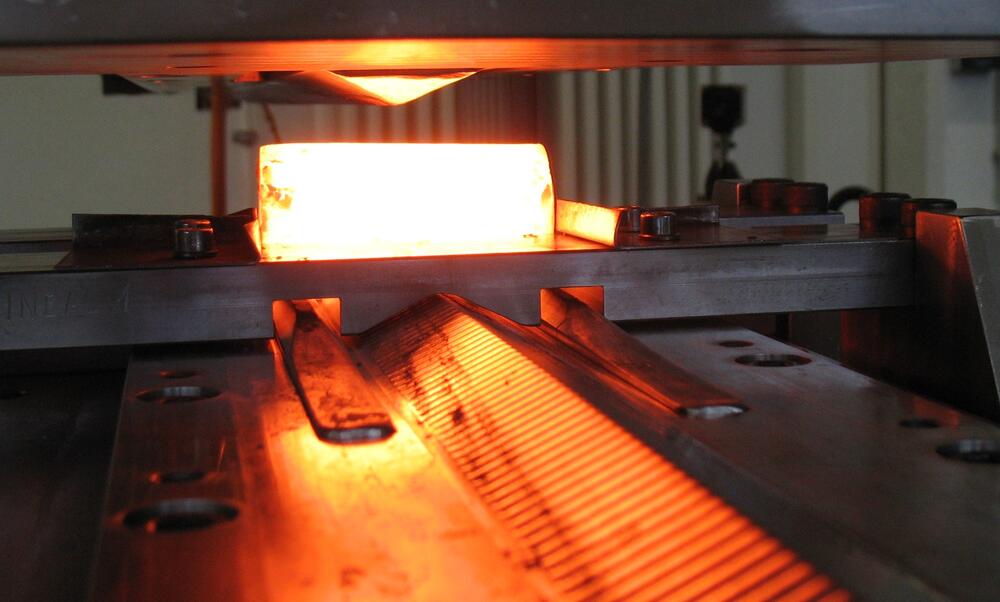DBU aktuell No. 2 | 2020 | English
Information on Grant Support Activities of the German Federal Environmental Foundation (Deutsche Bundesstiftung Umwelt)
1.) Material savings reduce greenhouse gas emissions: Resource-saving solid forming by cross wedge rolling
Solid forming: The name of this industrial sector is rarely mentioned in everyday life, but we encounter solid formed products every day: "Solid forming in the form of so-called forgings is often not far away. Examples include highly stressed components such as crankshafts or connecting rods in car engines or engine blades in aircraft engines," explains Prof. Dr.-Ing. Michael Marré, head of the laboratory for solid forming at the University of Applied Sciences Südwestfalen in Iserlohn.
In the massive forming process, three-dimensional bodies are formed, and 3.2 million tons of steel are processed annually. Due to the amount of energy required, around five million metric tons of carbon dioxide (CO2) are released during the production of the steel, and a good 700,000 metric tons of CO2 are released during the heating of the material for forming. Therefore, the amount of steel processed is a particularly good starting point for saving energy and greenhouse gases. So far, the average proportion of material lost during processing as so-called burr is around 25 percent.
Material saving: cross wedge rolling
One possibility for a material-saving forming process is so-called cross wedge rolling, which creates material-efficient preforms for subsequent drop forging. However, internal cracks and cavities can occur in the blanks during cross wedge rolling (Mannesmann effect), which must be avoided for component safety reasons. "Companies in the area of small batches therefore refrain completely from cross wedge rolling for safety reasons; companies in the area of large batches remain "on the safe side" and do not exhaust the limits of cross wedge rolling - they thus leave existing resource potential unused," is how laboratory manager Marré describes the current situation.
This is the starting point for a DBU project of the Industrieverband Massivumformung e. V. and the Fachhochschule Südwestfalen. In cooperation with the Hirschvogel Eisenach GmbH, the EJOT GmbH & Co. KG, the pressing plant Krefeld GmbH & Co. KG as well as LASCO Umformtechnik GmbH, the project aims to determine a safe design criterion for cross wedge rolling tools so that material damage can be avoided. The potential of cross wedge rolling could then be fully exploited, thereby reducing the excess material in the subsequent drop forging process.
For this purpose, the main influencing variables for crack formation were determined, a damage function was established, and the dimensionless variable "n" was derived. On this basis, more than 700 test parts were manufactured on a test stand at the University of Applied Sciences Südwestfalen using test tools, defects were detected and working characteristic diagrams for the design of cross wedge rolling tools were created.
Key findings from the DBU project
In this way, essential findings for cross wedge rolling could be obtained: With the help of the characteristic diagrams, the correct tool parameters and the limits of the rollable component parameters can be determined and taken into account in the design. It was also possible to identify a further influencing variable - the tool factor "forming tool area". "We would like to investigate in more detail what exactly happens in this area in terms of material damage and possible savings potential," explains Marré.
Corona: crisis and opportunity
This is exactly what the project partners now want to continue working on. The laboratory director sees the current corona pandemic as both a challenge and an opportunity: "The corona crisis will have a strong impact on companies in the manufacturing sector. It will take some time before corresponding call-offs and production volumes are available again. With appropriate support, the companies can change and emerge from the crisis stronger".
The DBU supports sustainable, innovative approaches like in this project with its funding. It is also possible to submit an online project outline at any time during the Corona crisis, see: www.dbu.de/corona and www.dbu.de/foerderung.
translated by DeepL


